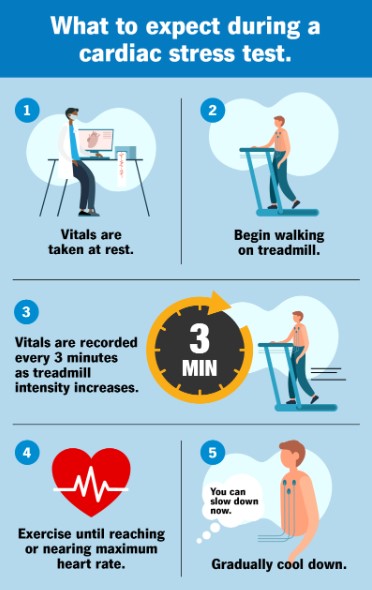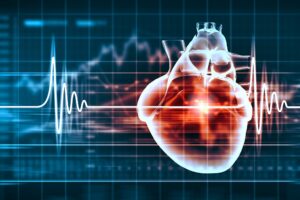ImageCare Radiology provides exercise stress tests in New Jersey at our three nuclear medicine facilities. This test helps to evaluate how well your heart reacts when it is working at its maximum capacity. Generally, it involves walking on a treadmill while being connected to an EKG machine to monitor your heart’s activity.
What is a Stress Test?
A stress test is a test that is commonly performed to identify certain heart conditions. It can help healthcare providers learn how well your heart pumps blood, whether your heart is receiving an adequate blood supply, and how you perform physical activity compared to other people of your age and sex. The test involves walking on a treadmill or riding a stationary bike to see if symptoms such as chest discomfort, shortness of breath, feeling like your heart is racing, or even dizziness can be reproduced while performing physical activity. This makes it easier for healthcare providers to identify and evaluate specific heart issues, such as issues with your muscles or valves, problems with getting adequate blood supply to your heart muscle, and electric stability of your heart at rest and during exercise. A cardiac stress test can help detect heart problems such as:
• Congenital heart disease
• Congestive heart failure
• Coronary artery disease
• Heart valve disease
• Hypertrophic cardiomyopathy
Cardiac stress tests help healthcare providers determine whether you need additional, often more invasive testing to confirm a diagnosis or whether treatment can lower your heart attack risk or reduce or eliminate symptoms you are experiencing.

How Does a Stress Test Work?
A heart stress test is a procedure designed to measure the heart’s ability to respond to external stress in a controlled clinical environment. This stress is typically induced through exercise on a treadmill or stationary bike or with medication that stimulates the heart, mimicking the effect of exercise. During the test, the patient’s heart rate, blood pressure, breathing, and electrocardiogram (ECG) are monitored. The primary goal is to identify any abnormal blood flow to the heart muscle, which may suggest the presence of blockages in the arteries that could lead to coronary artery disease or other conditions. The test also helps assess the severity of these blockages and aids in determining the safest level of exercise for the patient. By pushing the heart to work harder, the test can reveal problems with blood flow within the heart muscle that might not be noticeable otherwise, helping guide further treatment or management strategies for heart-related health issues.

During an exercise stress test, a technician will check your vital signs, including your resting heart rate and blood pressure. They will then attach small, sticky electrodes to your chest and arms which connect to the EKG machine. You will start by walking on a treadmill or pedaling a stationary bicycle at a leisurely pace. Over time, the intensity of the exercise will increase but will still be manageable. Throughout the test, technicians and exercise physiologists will ask how you are feeling. The test will end after maintaining your target heart rate long enough to capture readings about heart function, which usually takes about 10 to 15 minutes. Your target heart rate will be higher than at rest and based on your age and fitness level. If you experience severe symptoms or ask to stop, technicians may end the test early.
If you are unable to exercise, the heart stress test will be different. You will receive medications through a vein in your arm which simulates the effects of exercise on your heart by making it pump harder and faster. It may take up to an hour to start feeling the effects.
Many patients want to know “how long is a stress test?” If you are undergoing a basic stress test, you should expect it to last 10 to 15 minutes, with additional time to prepare for the exercise and recover afterward.
Who Should Undergo a Stress Test?
A stress test may be recommended for individuals who are experiencing symptoms of coronary artery disease or arrhythmia, such as chest pain, shortness of breath, irregular heartbeat, lightheadedness, dizziness, or palpitations, especially during physical activity. It is also commonly used to assess the health of people who are at high risk of heart disease due to factors such as hypertension, high cholesterol, diabetes, a family history of heart disease, or smoking. Additionally, doctors may advise a stress test for those who have already been diagnosed with heart conditions to monitor the effectiveness of their treatment or to determine the severity of their condition. The test may also be recommended for people who work in high-risk occupations, such as pilots or professional athletes, or as a part of a routine health examination in older adults who are starting to engage in a new exercise program and need to ensure that their heart can handle increased physical activity safely.
What are the Different Types of Stress Tests?
There are various methods to evaluate heart function under stress. All cardiac stress tests involve monitoring heart rate, blood pressure, oxygen levels, and electrical activity, but there are some differences between them:
- Exercise stress test: The most common type, this test involves walking on a treadmill or pedaling a stationary bike at increasing levels of difficulty, while heart rate, blood pressure, and electrocardiogram (ECG) readings are monitored. It helps determine how well the heart handles work.
- Nuclear stress test: Similar to the exercise stress test, but with an added component where a radioactive substance is injected into the bloodstream. This allows for imaging to visualize blood flow to the heart during exercise and at rest, providing a more detailed view of areas with poor blood flow.
- Stress echocardiogram: This test combines an ultrasound of the heart with the exercise stress test. Ultrasound imaging can show how well the heart muscles are working and pumping blood, helping to detect areas of the heart that are not functioning properly.
- Pharmacological stress test: Used for patients who are unable to exercise, this test involves administering medication that makes the heart beat faster and harder, as if the patient were exercising. Imaging tests, like an echocardiogram or nuclear imaging, are then used to examine heart function.Each type of stress test provides valuable insights into heart function under stress and is selected based on the specific health profile and capabilities of the patient.
Is Cardiac Stress Testing Safe?
Exercise stress tests are generally safe and have few complications. In case of any complications, trained healthcare providers such as exercise physiologists and cardiologists are present during the test to assess your performance, monitor data, and check for symptoms. They can provide immediate emergency treatment if needed. If you feel anxious or uncomfortable during the test, you can stop it at any time.
How do I Prepare for a Cardiac Stress Test?
To prepare for an exercise stress test, follow these guidelines:
- Don’t eat anything in the hours leading up to the test. If you are having a nuclear stress test, you might not be able to eat until after your test.
- Avoid caffeine for 24 hours before testing. This includes coffee, tea, energy drinks, and certain over-the-counter medications.
- Do not smoke or use tobacco products.
- Stop taking certain prescription medications, like beta-blockers and asthma inhalers, on the day of your test. Talk to your healthcare provider before stopping any medicines.
- Try to relax. Being nervous about heart testing is natural, but feeling anxious can affect your results.
- Wear lightweight, comfortable clothes and sturdy walking shoes.
If you have diabetes, it’s important not to skip meals, especially if you’re taking diabetes medications. However, you shouldn’t eat before your test. Talk to your diabetes care provider if you need assistance coordinating your meals and medications for test day.
Contact Us for Cardiac Stress Testing
Exercise stress tests are offered at our three nuclear medicine facilities:
- Jefferson
- West Orange
- Woodbridge
Please call us at (973) 810-8100 to schedule an appointment for a cardiac stress test or other medical imaging procedures